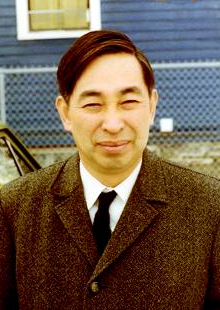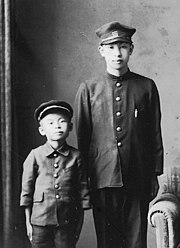This is an old revision of this page, as edited by Ndcroos (talk | contribs) at 20:26, 3 March 2024. The present address (URL) is a permanent link to this revision, which may differ significantly from the current revision.
Revision as of 20:26, 3 March 2024 by Ndcroos (talk | contribs)(diff) ← Previous revision | Latest revision (diff) | Newer revision → (diff) Japanese mathematician (1915–2008)| This article includes a list of general references, but it lacks sufficient corresponding inline citations. Please help to improve this article by introducing more precise citations. (March 2018) (Learn how and when to remove this message) |
| Kiyosi Itô | |
|---|---|
 Itô at Cornell University, 1970 Itô at Cornell University, 1970 | |
| Born | (1915-09-07)September 7, 1915 Hokusei, Mie, Japan |
| Died | November 10, 2008(2008-11-10) (aged 93) Kyoto, Japan |
| Alma mater | University of Tokyo |
| Known for | Itô calculus |
| Awards | Asahi Prize (1977) Wolf Prize (1987) Kyoto Prize (1998) Gauss Prize (2006) |
| Scientific career | |
| Fields | Mathematics |
| Institutions | University of Kyoto |
| Doctoral advisor | Shokichi Iyanaga |
| Doctoral students | Shinzo Watanabe |
Kiyosi Itô (伊藤 清, Itō Kiyoshi, Template:IPA-ja, September 7, 1915 – 10 November 2008) was a Japanese mathematician who made fundamental contributions to probability theory, in particular, the theory of stochastic processes. He invented the concept of stochastic integral and stochastic differential equation, and is known as the founder of so-called Itô calculus. He also pioneered the world connections between stochastic calculus and differential geometry, known as stochastic differential geometry, invited for the ICM in Stockholm.
Overview

Itô pioneered the theory of stochastic integration and stochastic differential equations, now known as Itô calculus. Its basic concept is the Itô integral, and among the most important results is a change of variable formula known as Itô's lemma. Itô calculus is a method used in the mathematical study of random events and is applied in various fields, and is perhaps best known for its use in mathematical finance. Itô also made contributions to the study of diffusion processes on manifolds, known as stochastic differential geometry.
Although the standard Hepburn romanization of his name is Kiyoshi Itō, he used the spelling Kiyosi Itô (Kunrei-shiki romanization). The alternative spellings Itoh and Ito are also sometimes seen in the West.
Biography

Itô was born in Hokusei-cho in Mie Prefecture on the main island of Honshū. He graduated with a B.S. (1938) and a Ph.D (1945) in Mathematics from the University of Tokyo. Between 1938 and 1945, Itô worked for the Japanese National Statistical Bureau, where he published two of his seminal works on probability and stochastic processes, including a series of articles in which he defined the stochastic integral and laid the foundations of the Itō calculus. After that he continued to develop his ideas on stochastic analysis with many important papers on the topic.
In 1952, he became a professor at the University of Kyoto to which he remained affiliated until his retirement in 1979. Starting in the 1950s, Itô spent long periods of time outside Japan, at Cornell, Stanford, the Institute for Advanced Study in Princeton, New Jersey, and Aarhus University in Denmark.
Itô was awarded the inaugural Gauss Prize in 2006 by the International Mathematical Union for his lifetime achievements. As he was unable to travel to Madrid, his youngest daughter, Junko Itô received the Gauss Prize from the King of Spain on his behalf. Later, International Mathematics Union (IMU) President Sir John Ball personally presented the medal to Itô at a special ceremony held in Kyoto.
In October 2008, Itô was honored with Japan's Order of Culture, and an awards ceremony for the Order of Culture was held at the Imperial Palace.
Itô wrote in Japanese, Chinese, German, French and English.
He died on November 10, 2008, in Kyoto, Japan, at age 93.
Scientific works of Kiyosi Itô

- Kiyosi Itô (1940). "On the Probability Distribution on a Compact Group". Proceedings of the Physico-Mathematical Society of Japan. 3rd Series. 22 (12): 977–998.
- Kiyosi Ito (1942). "Differential equations determining a Markoff process" (PDF). Zenkoku Sizyo Sugaku Danwakai-si (J. Pan-Japan Math. Coll.) (1077): 1352–1400.
- Kiyosi Itô (1944). "Stochastic integral". Proceedings of the Imperial Academy. 20 (8): 519–524. doi:10.3792/pia/1195572786.
- Kiyosi Itô (1946). "On a stochastic integral equation". Proceedings of the Japan Academy. 22 (2): 32–35. doi:10.3792/pja/1195572371.
- Kiyosi Itô (1950). "Stochastic differential equations in a differentiable manifold". Nagoya Mathematical Journal. 1: 35–47. doi:10.1017/S0027763000022819.
- Kiyosi Itô (1951). "On a formula concerning stochastic differentials". Nagoya Mathematical Journal. 3: 55–65. doi:10.1017/S0027763000012216.
- Kiyosi Itô and Henry McKean (1974). Diffusion Processes and Their Sample Paths. Berlin: Springer Verlag. ISBN 978-3-540-60629-1.
- Kiyosi Itô (1984). Foundations of Stochastic Differential Equations in Infinite Dimensional Spaces. Philadelphia: Society for Industrial and Applied Mathematics. ISBN 978-0-89871-193-6.
Notes
- "Renowned math wiz Ito, 93, dies", The Japan Times, November 15, 2008
- Lohr, Steve (November 23, 2008), "Kiyosi Ito, 93, Mathematician Who Described Random Motion, Dies", The New York Times
- Kiyoshi Ito Japanese mathematician / Encyclopedia Britannica
- "Donald Keene, 7 others win Order of Culture," Archived 2008-10-30 at the Wayback Machine Yomiuri Shimbun. October 29, 2008 (in Japanese)
References
- Obituary at The New York Times
- O'Connor, John J.; Robertson, Edmund F., "Kiyosi Itô", MacTutor History of Mathematics Archive, University of St Andrews
- Foellmer, Hans (May 2006), On Kiyosi Itô's Work and its Impact (.PDF), retrieved 2020-09-20
- Protter, Philip (June–July 2007), "The Work of Kyoshi Itô" (.PDF), Notices of the American Mathematical Society, 54 (6): 744–745, retrieved 2007-09-20
- Kunita, Hiroshi (May 2010), "Itô's stochastic calculus: its surprising power for applications", Stochastic Processes and Their Applications, 120 (5): 7622–652, doi:10.1016/j.spa.2010.01.013
See also
- Itô calculus
- Itô diffusion
- Itô integral
- Itô–Nisio theorem
- Itô isometry
- Itô's lemma
- Black–Scholes model
External links
- Kiyosi Itô(1915-2008) / Eightieth Birthday Lecture RIMS, Kyoto University, September 1995 / Research Institute for Mathematical Sciences, Kyoto University Kyoto
- Bibliography of Kiyosi Itô
- Kiyosi Itô at Research Institute for Mathematical Sciences
- Kiyosi Itô at the Mathematics Genealogy Project
- Kiyoshi Ito Japanese mathematician / Encyclopedia Britannica
- 1915 births
- 2008 deaths
- People from Mie Prefecture
- 20th-century Japanese mathematicians
- 21st-century Japanese mathematicians
- Kyoto laureates in Basic Sciences
- Foreign associates of the National Academy of Sciences
- Probability theorists
- Wolf Prize in Mathematics laureates
- University of Tokyo alumni
- Academic staff of Kyoto University
- Cornell University faculty
- Members of the French Academy of Sciences
- Institute for Advanced Study visiting scholars
- Recipients of the Order of Culture
- Laureates of the Imperial Prize
- Cornell University people